
German Government Knew Euro Would Fail
Former German Chancellor Helmut Kohl was warned that the euro was doomed to fail, according to secret documents obtained by Spiegel.
“Documents from the Kohl administration, kept confidential until now, indicate that the euro’s founding fathers were well aware of its deficits,” it wrote May 8.
The Trumpet has long warned that European leaders knew exactly what they were doing when they created the euro. The current crisis is not a mistake. They knew that, as Spiegel writes, “a common currency cannot survive on the long term if it is not backed by a political union.” They pushed ahead because they believed a common currency would force the unwilling European people to form a political union.
The documents released to Spiegel give yet more evidence of this.
Italy was allowed to join the euro after some deceptive accounting meant it fulfilled the entrance criteria. “However, the Kohl administration cannot plead ignorance,” writes Spiegel. “In fact, the documents show that it was extremely well informed about the state of Italy’s finances.”
Not only did Kohl ignore warnings that Italy’s debt was way too high, but “the documents that have now been released suggest that the Kohl administration misled both the public and Germany’s Federal Constitutional Court,” it writes.
Kohl’s government told the court that Italy’s breaking of the euro’s financial rules was “neither recognizable nor to be expected.” Meanwhile, the government’s economic advisers were saying that Italy’s “high debt levels” carried “enormous risks.”
Kohl’s government lied to the equivalent of Germany’s supreme court to make sure the euro went ahead. He knew that then Italian Prime Minister Romano Prodi was fiddling the books to make Italy look ready for the euro.
JP Morgan Asset Management calculated last week that the eurozone was one of the worst possible common currency zones. The economies involved are too different. In fact, it found that a currency zone made up of countries whose names start with the letter M would make a better currency union than the euro.
As former EU civil servant and author of The Rotten Heart of Europe Bernard Connolly warned in 2007: “And, whereas the mission of the Fed is to avoid a financial crisis, the mission of the ecb [European Central Bank] is to provoke one. The purpose of the crisis will be, as Prodi, then Commission president, said in 2002, to allow the EU to take more power for itself.”
The key leaders knew the euro wasn’t an optimal currency zone. They knew the only way it would work would be to centralize even more power in Brussels. But they couldn’t get voters to agree to this.
Now, as Spiegel observes, all possible solutions to the crisis “boil down to individual countries relinquishing more authority and the central government in Brussels acquiring more in return.”
This is exactly what the euro’s founders wanted.
